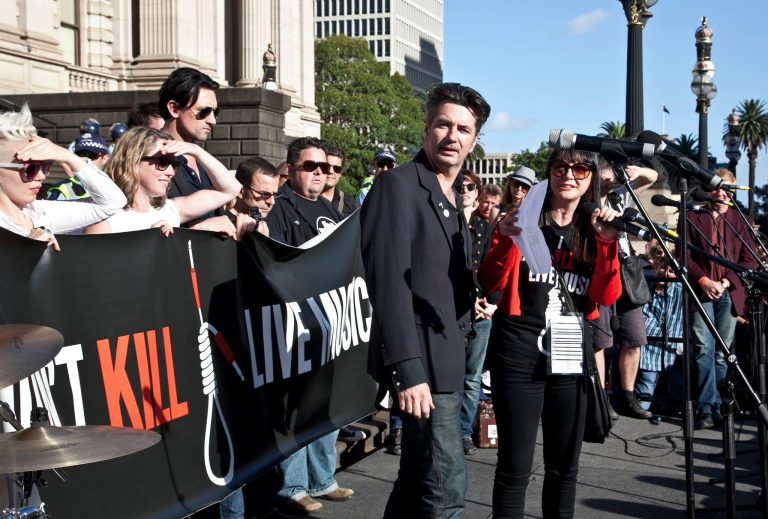
Pictured: Helen Marcou AM and Quincy Maclean AM at the SLAM Rally 2010 (photographer unknown)
To celebrate the 10 year anniversary of the SLAM (Save Live Australia's Music) rally, Music Victoria speaks to those who were there at the frontline about their memories of the time and their observations over the passing years.
Helen Marcou AM, alongside her partner Quincy Maclean AM (co-owners of Bakehouse Studios), co-founded grassroots movement SLAM (Save Live Australia's Music and spearheaded and staged the SLAM rally of 2010 where 20,000 protesters marched on Parliament House in Melbourne in support of Live Music. The SLAM rally was described as “the largest cultural protest in Australia’s history”. Helen and Quincy continue to advocate for reforms in the contemporary music sector and have helped put live music firmly on the political agenda.
Helen takes us back to the events of 2010...
Quincy and I formed SLAM in early 2010 to jump in and support the FG4LM group who were at that stage butting heads with liquor licensing and the dept of justice.
After the outpouring of emotion from the music community in response to the Tote Rally, we believed the time was right to march on parliament, make some noise and take back our music culture. At the time, we hadn’t realized that we founded a movement, or that we were at the helm of a collective that would enact so much change over a decade.
We had spent years at Bakehouse, closely connected to bands and artists, Quincy and our children, Angus & Lola are all musicians, music is the glue that connects us to our community. There was something fundamentally wrong with policy that equated ‘music with violence’. We wouldn’t stand for this and the erosion of our culture.
Walking down the middle of Bourke street, with other fans, bands, kids, dogs and the truck. I felt the rumble of the crowd and for a brief moment, a true sense of people’s power and a reclaiming of political agency.
The list of 10 years = 10 changes is a testament to the legacy of the SLAM movement.
1. Changing the law – objects of the Act to forever protect live music
The music community through their unity were central to fundraising efforts 10 years ago in the wake of the Black Saturday fires. We’ve seen this again with musicians giving what little they have to support others. Part of the reason Quincy and I were so vigilant with SLAM is that Music and the artists that give their all deserve to participate and practice their culture in a supportive and nurturing environment, free from the barriers of poor regulation.
The next few years will be tough and we’re seeing the impacts of climate disaster and political upheaval. The SLAM movement is a positive story of harnessing people power and we should use this time as a reminder when navigating the future.